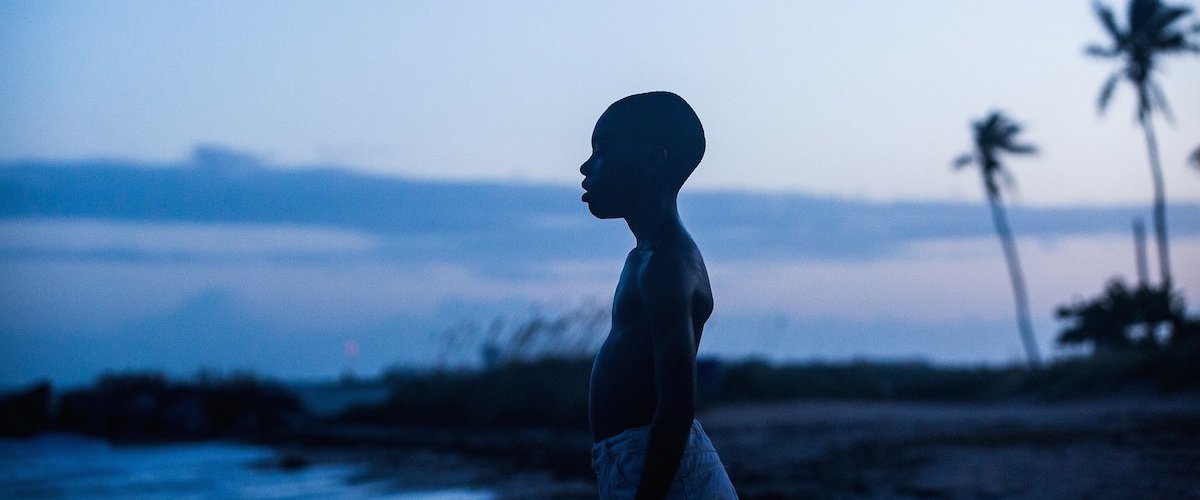
Directed by: Barry Jenkins
Starring: Mahershala Ali, Naomie Harris, Alex R. Hibbert, Andre Holland, Janelle Monae, Ashton Sanders, Jharrel Jerome, Trevante Rhodes
We first meet Chiron as a young boy nicknamed "Little" (Hibbert). He is smaller than the other kids and bullied, although not just because he is little. When the local drug dealer Juan (Ali) first meets Little, he finds him cowering in an abandoned apartment complex. Little doesn't speak much and his mother isn't home, so Juan takes him for a bite to eat. Yes, Juan is a drug dealer and controls the streets of his Miami neighborhood, but he takes on a paternal role with Little. He takes him to his nice home where his wife Teresa (Monae) feeds Little and offers him a room for the night. Juan returns Little home the next morning to his mother Paula (Harris), who appears at first to be a working mother but we soon learn is a crack addict who buys her drugs on Juan's territory.
Ali is likely to garner an Oscar nomination as Juan and it is well deserved should it happen. We see the nurturing, paternal side of Juan (who appears to have no children of his own) as he teaches Little how to swim and has heartfelt conversations with him. Little asks him point blank, "What is a faggot?" We know Little has been called that often. Juan's response is not typical of macho street hustlers looking to maintain his cred. His answer is more sensitive and even perhaps more evolved. Ali is masterful at showing us the conflict that must exist in him at all times. We understand that the kindly father figure to Little is also the same man who rules his neighborhood ruthlessly. He encounters Paula smoking crack in a car and their conversation about Little's well-being is heartbreaking. Watch the scene where Little puts two and two together that Juan deals drugs and his mother is a drug user. Watch the shame on Juan's face. It is immensely powerful.
The movie suffers a bit when Juan leaves the scene. We soon see Little grow to be Chiron (Sanders), a high school age boy still being bullied over his sexuality. His mother is now a full-blown addict with little hope. Teresa is still the sanctuary for Chiron and she picks up where Juan left off as a surrogate parent. Chiron is still lost, unsure how to deal with his sexuality and the bullies who torment him daily. He finds a friend in Keith (Rhodes), who puts on a macho front but we clearly see is attracted to Chiron. The feeling is mutual and the two share an intimate moment on a beach at night. Their relationship takes a downward turn as peer pressure on Keith forces him to attack Chiron, who nobly does not fight back.
The third act involves Chiron as a grown man called Black (Jerome), who is now a drug dealer himself. He wear the gold chains and a golden grill in his mouth, but we sense his loneliness. A call out of the blue from Keith sets the stage for the film's final resolution between Keith and Black. Keith is now a cook, although still has 18 months of probation left, and sees hope for the future. Black sees a dead end as a low level hoodlum. Their meeting is a bit long-winded, but depends more on what isn't said for its power.
Writer-director Jenkins grew up in Miami and the film captures the lush greens and sunshine while the characters' desperation lurks under the surface. We see three different actors play Chiron in three stages of his life. In each actor's performance, we see the telltale signs of fear and pain in the eyes. Three actors give one seamless portrayal of this boy who is never truly able to fit in. We also see the calm and peace in the adult Keith's (Holland) eyes when he talks to Black. He has come to terms with who he is and is finally at peace at long last. He only hopes Black, whom he still loves, can be at peace as well.
Jenkins' film was relatively inexpensive to make, but it never comes across as cheaply made. I do wish the final encounter between Keith and Black was trimmed by a few minutes to condense its raw emotion. I would have liked to have seen more of Juan, especially as an older man still looking after the boy he once knew as Little who grew up to be a man who followed in his footsteps, which I think Juan would definitely disapprove of. But, Moonlight has enough moments of insight and genuine strength to be a unique look at a black man who grows up in an uber-masculine society, ultimately learns to play by its rules, but still frets because happiness eludes him.
No comments:
Post a Comment